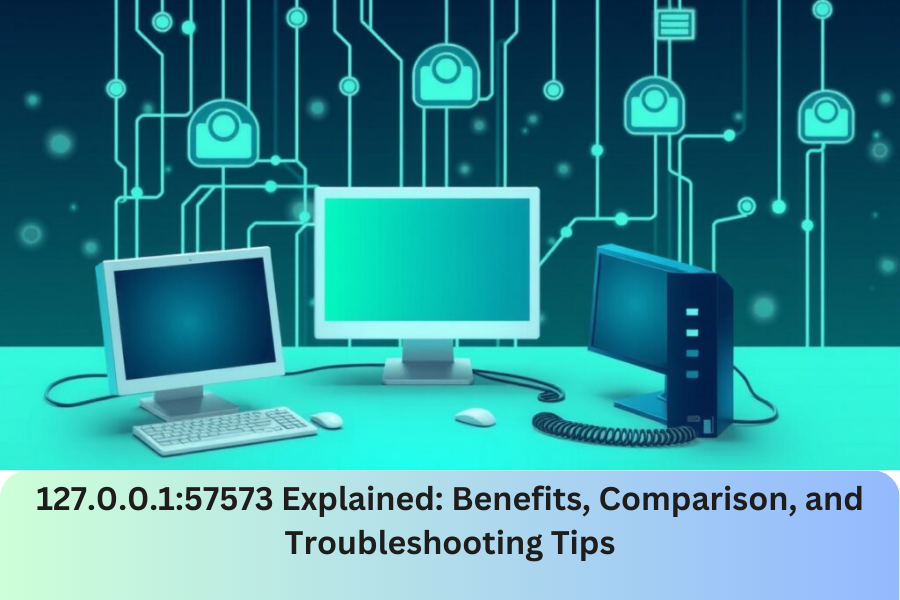127.0.0.1:57573 Explained: Benefits, Comparison, and Troubleshooting Tips
In the realm of computer networking, IP addresses serve as vital tools for identifying and connecting devices within a network. One such IP address, 127.0.0.1:57573, is commonly encountered by developers and network administrators, especially when working in local environments. Understanding this IP address and its associated port number is crucial for optimizing internal communication within a device, conducting tests, and ensuring secure application development.
This article delves into the core functions and technical workings of 127.0.0.1:57573. We’ll cover its benefits, comparisons with other localhost addresses, troubleshooting tips, and advanced concepts that developers and IT professionals often explore to optimize their workflows.
What is 127.0.0.1:57573?
127.0.0.1:57573 is a localhost IP address combined with a specific port number (57573). The IP address, 127.0.0.1, is referred to as a loopback address, which points directly to the local machine. This allows internal communication on the same device. The port number (57573) designates a specific process or service running on the machine.
In simpler terms, when a service or application on your computer needs to communicate with itself, it can do so using the IP address 127.0.0.1 with an associated port number. The IP address ensures that the communication stays within the device, without needing to traverse external networks, which improves both speed and security.
Main Functions of 127.0.0.1:57573 Local Host
The primary role of 127.0.0.1:57573 is to enable local testing and development. Developers and network administrators use this localhost address to run applications and services in a controlled environment. Here are some of the main functions:
- Testing Web Applications: Developers often use 127.0.0.1 to run web applications locally before deploying them to a live server. This setup allows for efficient debugging, troubleshooting, and testing without risking exposure to external networks.
- Internal Communication: Applications and services on the same device can communicate with each other using this address, bypassing the need for external networks. This is useful for running database servers, APIs, and other services that need to interact locally.
- Security: Since 127.0.0.1 is restricted to local communication, it provides an added layer of security. External users cannot access services running on this address, reducing the risk of unauthorized access.
- Debugging and Troubleshooting: Using 127.0.0.1:57573 allows developers to troubleshoot issues in a secure environment, testing how applications respond under various conditions without compromising the live server.
How It Works
When an application on your computer needs to communicate with itself, it uses the IP address 127.0.0.1. This IP address is reserved for loopback functions, meaning it only works for internal communications. It cannot be accessed from external networks.
If a service is running on port 57573, entering 127.0.0.1:57573 into your web browser or application will connect you to that service. This is how developers can test and run services locally.
For example, a developer working on a web server might configure it to listen on port 57573. By entering 127.0.0.1:57573 in their browser, they can view and test the site on their local machine before pushing it to a live server.
How Does 127.0.0.1:57573 Compare to Other Localhost Addresses?
While 127.0.0.1 is the standard IP address used for localhost, it’s not the only one available. Other IP addresses like 0.0.0.0 and ::1 serve similar purposes but with some differences:
- 0.0.0.0: This IP address is typically used for broadcasting to all available network interfaces. It doesn’t refer to a specific device, unlike 127.0.0.1, which is strictly for local communication.
- ::1: This is the IPv6 equivalent of 127.0.0.1. IPv6 is the next generation of IP addresses, designed to replace IPv4 due to the increasing number of devices connected to the internet.
The main difference with 127.0.0.1:57573 is the port number 57573. Each port is tied to a specific service or process running on the local machine. The uniqueness of this port number distinguishes it from other localhost addresses and allows multiple services to run on the same device without conflicts.
Benefits of Using 127.0.0.1:57573
Testing and Development
One of the biggest advantages of using 127.0.0.1:57573 is for local testing and development. Developers can test web applications, APIs, and services in a local environment, ensuring everything works properly before deploying it to a live server. This allows for faster iterations and safer experimentation, as the application is not exposed to the public.
Improved Security
Since 127.0.0.1 is inaccessible from outside networks, it provides a built-in layer of security. External users cannot connect to services running on this address, which minimizes the risk of unauthorized access or attacks. This is particularly useful for testing sensitive applications or services that require high levels of security during development.
Faster Communication
Using 127.0.0.1 for internal communication speeds up the process. Since data doesn’t need to leave the device, communication is almost instantaneous. This is much faster than sending data across an external network, which involves additional steps like routing and DNS resolution.
Common Issues and Fixing Tips
While using 127.0.0.1:57573 is generally straightforward, there are a few common issues that developers and network administrators might encounter. Here are some common problems and their solutions:
Port Already in Use
If you see an error message stating that port 57573 is already in use, this means another application or service is already using that port. To resolve this, you can either stop the conflicting application or change the port number in your application’s configuration.
Firewall Blocking
Sometimes, firewalls may block access to localhost ports. If you cannot connect to 127.0.0.1:57573, check your firewall settings. You may need to configure the firewall to allow connections to port 57573 or add an exception for the specific application.
Service Not Running
If you cannot connect to 127.0.0.1:57573, make sure the service you are trying to access is running. Check the application’s documentation or use a terminal command to verify that the service is active.
Incorrect Port Number
Ensure that you are using the correct port number. Each service or application uses a designated port, and using the wrong port number will result in a failed connection. Double-check your configuration to ensure you are connecting to the correct port.
Advanced Concepts
Port Forwarding
Port forwarding allows you to access services running on 127.0.0.1:57573 from another device on the network. This involves mapping an external IP address and port to the internal localhost address and port. Port forwarding is commonly used for remote access to services running on a local machine.
Virtual Hosts
Web developers often use virtual hosts to run multiple websites on a single server. Virtual hosts allow different domain names to point to specific directories on the server, all accessible through localhost with different port numbers. This is useful for testing multiple projects simultaneously on one machine.
Conclusion
The localhost IP address 127.0.0.1:57573 is an essential tool for developers, network administrators, and tech enthusiasts. It enables internal communication, secure testing, and efficient development of applications and services. By mastering the usage of 127.0.0.1 and its associated ports, you can streamline your development workflow, improve security, and troubleshoot issues with ease.
Whether you’re debugging a new web application or configuring a local service, understanding the nuances of 127.0.0.1:57573 is crucial for optimizing your network and development environment. By following the troubleshooting tips and exploring advanced concepts like port forwarding and virtual hosts, you’ll be well-equipped to handle any challenges that come your way.
Keep an eye for more latest news & updates on glamourtomorrow






